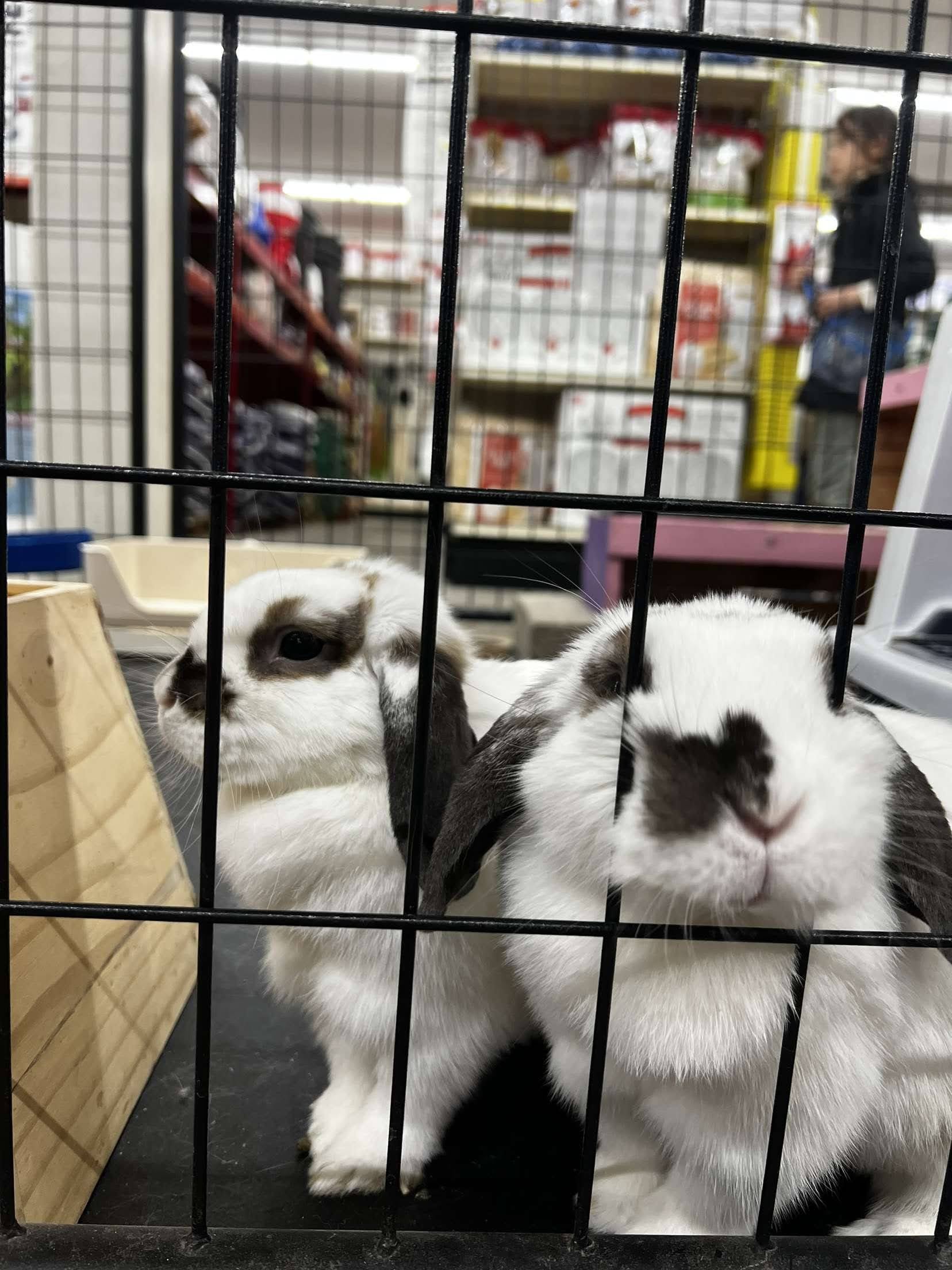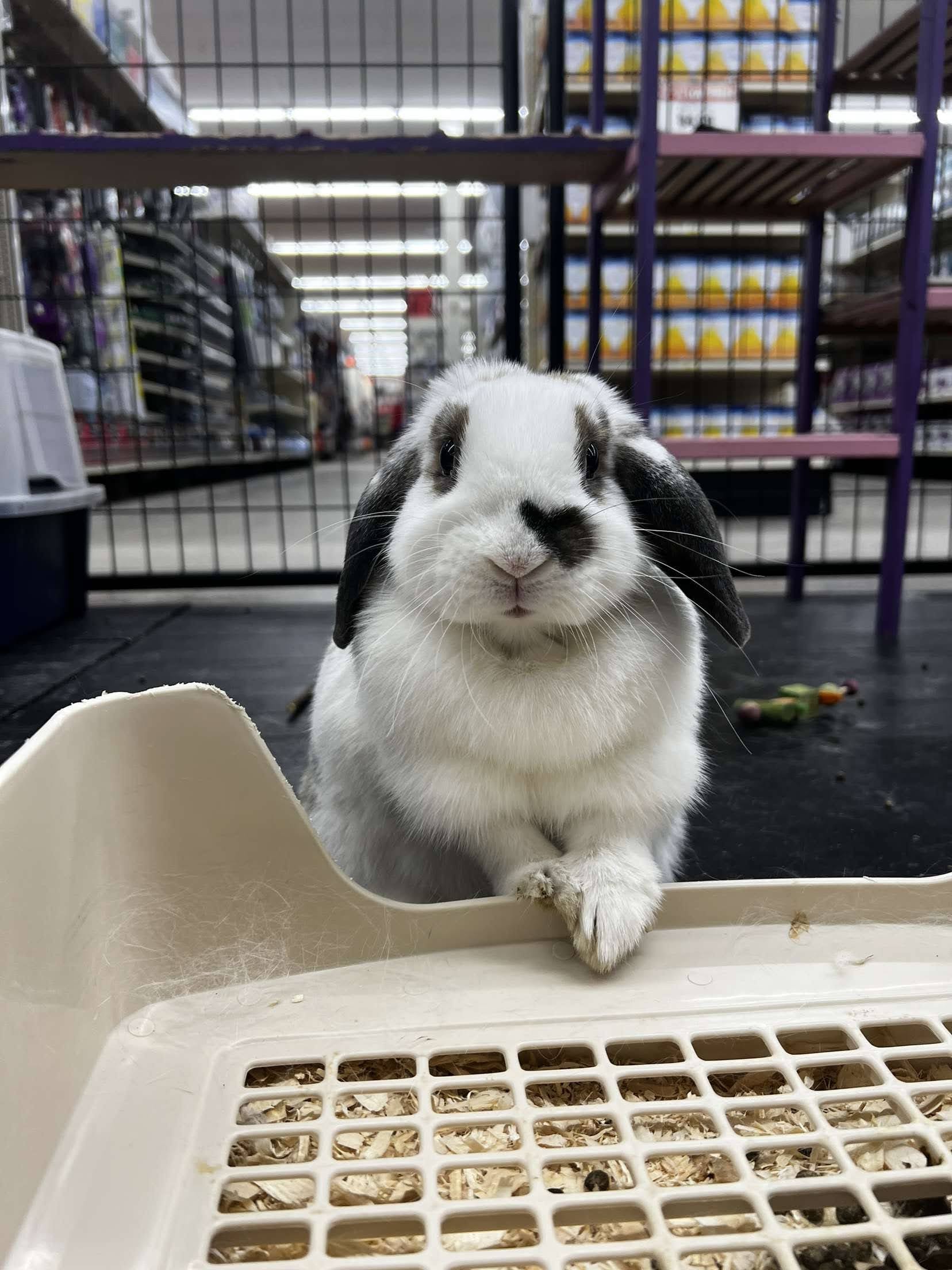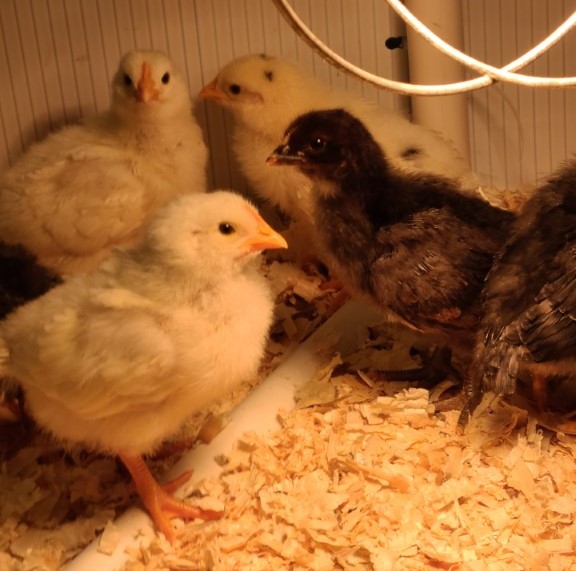By Ellie Hettel
Now that spring has finally arrived, signs of new life are everywhere. From flowers to newborn animals, the long-awaited change of seasons is here. Advertising featuring fuzzy baby chicks and cuddly bunnies makes it’s hard to resist these cute animals. Parents are often lured by such advertising. Buying these cute and fluffy creatures has its appeal initially, but many people are unaware of the care, hard work, and commitment these animals require.
According to research, 80% of all bunnies purchased around Easter are given up.
Bunnies and rabbits can get quite large and need an area about as large as a bedroom.
Runnings employee Hannah Zuber works in the pet department and owns a bunny herself. She also takes care of the store’s bunnies, Thelma, and Louise.

Louise (left) and Thelma (right) are Holland Lop sisters who are the stores bunnies. (Photo/Anna White)
“Thema and Louise are very spoiled,”Zuber said.
They live in a large cage with a gymnasium for them to climb and hop all over. Shoppers often stop by with treats for the pair.

Thelma waits patiently for a treat by her gymnasium in her cage. (photo/ Anna White)
“The only thing I feel bad about is that they don’t get outside. They don’t get grass, they like to eat normal grass. They get their lettuce and other herbs, but they like to go out and get it themselves, when its brought to them here,” Zuber said.
Bunnies need to exercise regularly and are very playful, people who buy a bunny on a whim are usually unaware of how hyper they can be and end up keeping them locked up in a cage for the majority of their life.
“They are very smart and intelligent animals, and can be litter trained, so you can keep them inside if chosen to. I have a bunny at home and I have her in a home made bunny cage, but in the summer when its nice out I take those round portable kennels, I attach it to the ground because they like to dig, and she has her exercise,” Zuber said.
Grooming is also a large part of taking care of a bunny.
“They shed a lot like a dog, so there is a lot of grooming, you also have to cut their nails. There is just a lot that people don’t realize, and different breeds need different things.” Zuber said.
According to research, bunnies live for about 7-12 years; depending on the breed. The majority of chicks live until 8 years old, and of course, start to lay eggs.
Owner of Pulcino’s Poultry Waterfowl Farm, Dawn Pulcino says that it isn’t uncommon for families to think chicks will make good pets.

Pulcino’s Poultry Waterfowl Farm on 5745 Lake Rd, Brockport NY, the baby chicks are in their coop underneath their heat lamp. (Photo/Dawn Polcino)
“A lot of people go to the pet store and see the cute chicks, and they want to cuddle it like it’s a stuffed animal. They don’t realize that that is a farm animal and is there to produce food. Of course, you want to be kind and caring to your animals, but the novelty wears off in a few weeks,” Pulcino said.
In 1964, Pulcino’s parents started the Pulcino’s Poultry Waterfowl Farm, where Pulcino has spent her whole life, and has now taken over. Pulcino takes pride in her family’s work on the farm where they give their livestock and chickens the best possible life. Pulcino visits the chickens twice a day to let them out, feed them, give them water, and clean their coops.
“When you first get the baby chicks you have to get a light, or a heating plate, which has to be about 95 Fahrenheit, and every week you have to lower that temp down. I have heard stories, where people have it so hot to where they cook the babies,” Pulcino said.
Pulcino says that the winters are especially difficult. Having no running water to the coops, Pulcino has to lug 30 gallons by hand down to the coops more often because the water freezes.
Pulcino also has to watch out for the avian flu. She had to cover her coops and flocks with tarp because the flu spreads from birds flying overhead and defecating. She had to wash her boots in a solution of water and Clorox before entering the coop, then when she reaches her house she has to wash her boots again and change her clothes in order to not spread the flu.
Pulcino says that if you have a decent amount of land, then having chicks or hens to lay eggs is not a bad idea, you just need to be prepared.
“If this is something you really want to do, ok, but get real educated first, because its no picnic all the time.” Pulcino said.
Although these animals do make good family members, they need proper care, space, and attention. Make sure you do your research, prepare for the hard work and commitment you are about to make, and know it’s the right decision for you and your family.





















